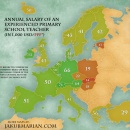 |
Comma before ‘that’ and ‘which’
What distinguishes English from most other languages is its use of commas before a dependent (subordinate) clause. Dependent clauses (...)
April 22, 2015 – Jakub Marian – English
|
 |
Difference between ‘go’ and ‘walk’ in English
When you travel from one place to another, most languages require that you use a verb based on how you travel, such as “walk” (which means (...)
April 18, 2015 – Jakub Marian – English
|
 |
‘Literally’ and ‘figuratively’ in English
The adverb “literally” means “in the literal or strict sense”. For instance, it is commonly used when translating between two languages (...)
April 13, 2015 – Jakub Marian – English
|
 |
‘Interested in doing’ vs. ‘interested to do’ in English
Some English teachers claim that “interested to” is always wrong, but this claim is not substantiated by actual usage. The fact is, the (...)
April 11, 2015 – Jakub Marian – English
|
 |
‘Shall’ vs. ‘will’ in English
The traditional rule says that “shall” indicates the future tense for the first person (I shall, we shall), while “will” indicates the (...)
April 4, 2015 – Jakub Marian – English
|
By the way, have you already seen my brand new web app for non-native speakers of English? It's based on reading texts and learning by having all meanings, pronunciations, grammar forms etc. easily accessible. It looks like this:
 |
‘Did he died’ vs. ‘did he die’ in English
The phrase “Did he died?” is a running joke in the comment sections of YouTube and similar websites. People use it when something mildly (...)
March 27, 2015 – Jakub Marian – English
|
 |
Difference between ‘super’ and ‘superb’ in English
Both “super” and “superb” are common, but they are not completely interchangeable. Super is used nowadays mostly as an adverb meaning (...)
March 24, 2015 – Jakub Marian – English
|
 |
‘Make a photo’ vs. ‘take a photo’ in English
When you use a camera to “capture” a picture of something, lots of languages describe the situation using the verb “make” (e.g. ein Foto (...)
March 22, 2015 – Jakub Marian – English
|
 |
‘Happy about’ vs. ‘happy with’ in English
The distinction between “happy about” and “happy with” is a subtle one, and sometimes the two expressions are quite interchangeable. As a (...)
March 19, 2015 – Jakub Marian – English
|
 |
Salary of primary school teachers by country in Europe
OECD recently published a new study about education in OECD member countries. The study itself contains a vast amount of data from various (...)
March 18, 2015 – Jakub Marian – Maps
|
